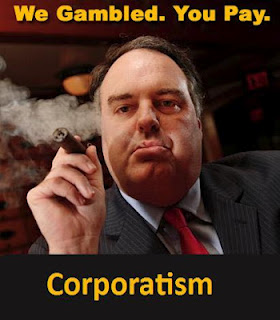Francine McKenna writes the blog, Re: the Auditors. I like her writing quite well, as it is clear and concise, and enjoy the depth of understanding of the accounting profession she brings to bear on the issues of the day.
In this guest post at the blog BankThink of The American Banker she illuminates the ongoing mistreatment of the MF Global customers whose money was stolen three times: once by MF Global, a second time by MF Global's Banker, and a third time by Banks and Funds with special access to information through the financial system.
What she is adding to what others, including myself, have said is the linkage she draws between the Banks and the MF Global collapse via their common auditors.
I suppose we cannot blame the Big Wall Street Banks, because as the recent Greg Smith resignation incident has shown, they are in the business of cheating their customers at every opportunity. In fact, one could say that cheating through the hiding and manipulation of information and the subversion of the rules is their stock in trade.
Although as the financial press was quick to point out it can't be called cheating because everyone who is not a naive fool should know what they are doing, and keep both hands on their wallets, and trust nothing that the Banks or Wall Street, or their enablers in the press and the government, say. The favorite rationale of last resort on the Street is your own foolish trust. After all, no one made you do business with them. No one made you buy that fraudulent instrument. No one made you deposit your money with a proto-criminal enterprise. So be a good muppet and shut up and pay up.
They are doing God's work. It was our mistake to assume that we knew which god it was that they are serving. They serve Mammon, and themselves, for they would be as gods.
The real shame of this is with the regulators, who were hired by the customers to protect them. Not by the industry, not by the corporations, but by the people, for it is still a government of, by, and for the people, at least on paper and for now.
That is what they are paid to do, and the oath which they have sworn to uphold.
BankThink
Banks with Inside Track Take Advantage of MF Global Mystery
By Francine McKenna
March 16, 2012
...All parties have practiced misdirection. The trustees, the regulators, and the investigators from the FBI and U.S. Attorney's office dole out anonymous updates to reporters with the goal, I suppose, of attracting more information, buying time, or preparing customers for the worst.
There is one thing we know for sure. Some banks must know where the missing customer funds are.
Otherwise why would they be so sure that customer claims will be paid in full and paid soon that they're bidding as much as 90% of face value for the claims?
"These banks are so confident that they’re buying the claims for their own account, not resale," says Barry Slotnick, a white-collar defense lawyer and a partner at Buchanan Ingersoll & Rooney PC who's not involved in the case.
The New York Times has reported that Barclays, the Royal Bank of Scotland and Seaport Group, a firm that specializes in distressed assets, "are all scrambling to buy MF Global customer claims." Barclays has agreed to purchase most claims for 90% of face value and RBS says it will pay 91% for the claims of institutions (but not those of individuals). Seaport is adding something else: $200,000 to help fund the Customer Commodity Coalition, a group of MF Global clients led by attorney James Koutoulas, who negotiated the offers. Other banks willing to buy claims include Credit Suisse, which was offering more than 80%, and Deutsche Bank, offering 89%.
I think the banks know something the rest of us don't know. They certainly have windows on the situation not available to the general public.
Barclays, for example, is audited by PricewaterhouseCoopers, which happens to have been MF Global’s auditor. The British bank is also no stranger to the problem of keeping customer assets secure. The U.K. Financial Services Authority recently fined Barclays Capital £1.12 million for failing to protect and segregate client money held in sterling money market deposits.
Credit Suisse, meanwhile, is audited by KPMG, the professional services firm that is also running the MF Global bankruptcy in the U.K., Canada and Singapore.
Deutsche Bank is a creditor in the MF Global Chapter 11 proceedings due to its role as the indenture trustee for four different bond issues. Next to JPMorgan Chase, Deutsche Bank is the most important non-customer creditor of MF Global. As a member of the creditors committee, Deutsche is privy to information customers do not have....
Francine McKenna writes the blog re: The Auditors, about the Big Four accounting firms. She worked in consulting, professional services, accounting and financial management for more than 25 years.
Read the rest here.


































